


Yamdruk-tso “trektocht”

Before the trek
Part of our trip is a four-day trek around Yamdruk-tso (Scorpion lake), one of Tibet’s holy lakes. In order to get there from Lhasa, we have to take a high (ca. 4800 m) pass. The pass itself is close enough to Lhasa to be a tourist attraction in itself. When we reach the top of the pass, we are in the clouds. Bad luck for those who came just for the pass! While we are standing there, warding off salesmen, brief glimpses of the lake shine through. We take the bus again, go down one switchback, and there it is in its full glory!
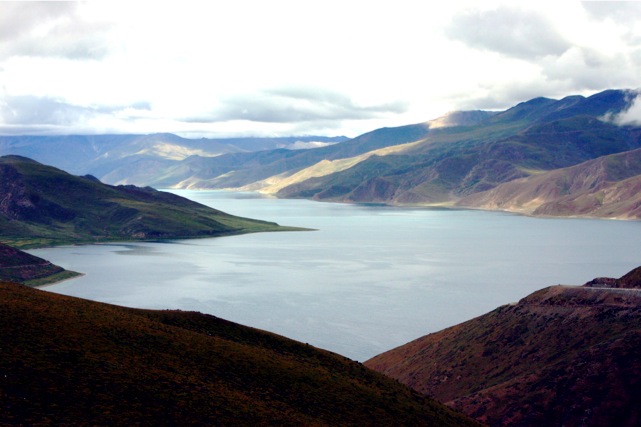
On our way to the starting point of our trek, we pass through a village in which they have some sort of parade. 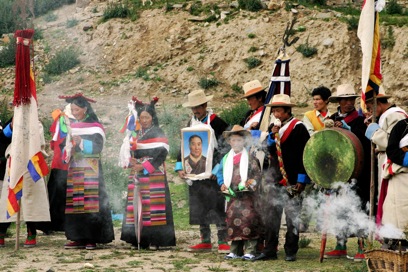 Dawa, our sometimes overenthusiastic guide, immediately calls for a stop, so we observe an odd collection of dressed-up men and women who are standing in a circle, not doing anything obvious. At some point, the men with the red head gear mount the horses, and everyone else follows. One fellow has trouble with his horse: it takes the help of four others to get him on it, and afterwards it still gives him trouble.
Dawa, our sometimes overenthusiastic guide, immediately calls for a stop, so we observe an odd collection of dressed-up men and women who are standing in a circle, not doing anything obvious. At some point, the men with the red head gear mount the horses, and everyone else follows. One fellow has trouble with his horse: it takes the help of four others to get him on it, and afterwards it still gives him trouble.
 Dawa, our sometimes overenthusiastic guide, immediately calls for a stop, so we observe an odd collection of dressed-up men and women who are standing in a circle, not doing anything obvious. At some point, the men with the red head gear mount the horses, and everyone else follows. One fellow has trouble with his horse: it takes the help of four others to get him on it, and afterwards it still gives him trouble.
Dawa, our sometimes overenthusiastic guide, immediately calls for a stop, so we observe an odd collection of dressed-up men and women who are standing in a circle, not doing anything obvious. At some point, the men with the red head gear mount the horses, and everyone else follows. One fellow has trouble with his horse: it takes the help of four others to get him on it, and afterwards it still gives him trouble. 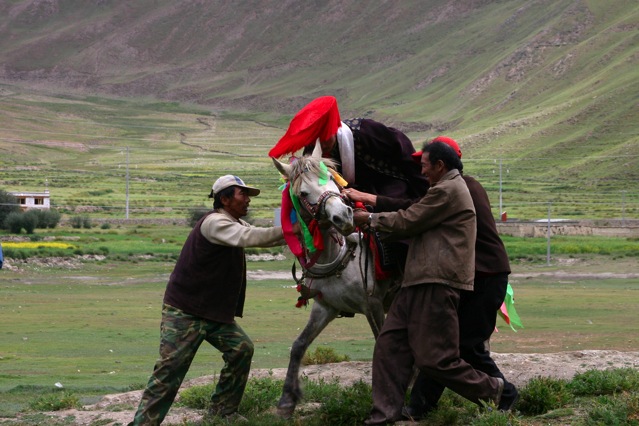
Eventually, we arrive at the start of the trek. The lake, which is at ca. 4500 m, offers fabulous views on snow-capped mountains, one higher than 7 km.
First leg
Today, we walk two hours along the lake to the first camp. Although the going is easy, it is quite strenuous because of the altitude. 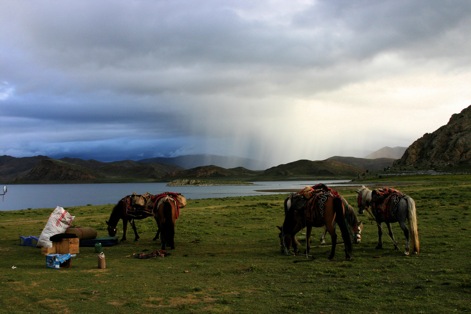 When we arrive, the tents are already set: Eight small tents to sleep in, and two big tents for cooking and eating. The cooks have done an amazing job making dinner in the middle of nowhere with tens of different dishes. No astronaut fodder for us!
When we arrive, the tents are already set: Eight small tents to sleep in, and two big tents for cooking and eating. The cooks have done an amazing job making dinner in the middle of nowhere with tens of different dishes. No astronaut fodder for us!
 When we arrive, the tents are already set: Eight small tents to sleep in, and two big tents for cooking and eating. The cooks have done an amazing job making dinner in the middle of nowhere with tens of different dishes. No astronaut fodder for us!
When we arrive, the tents are already set: Eight small tents to sleep in, and two big tents for cooking and eating. The cooks have done an amazing job making dinner in the middle of nowhere with tens of different dishes. No astronaut fodder for us!Let’s get the urgent task of honoring these fine men out of the way:
Even though it was our group that whined, panted, and complained, it was really the “Camping team” who did all the real work: The driver Dawa, our guide Dawa, Lobsang (monk and co-driver - we’d rented the bus at Ganden monastery), the fabulous cook and his two awesome helpers. 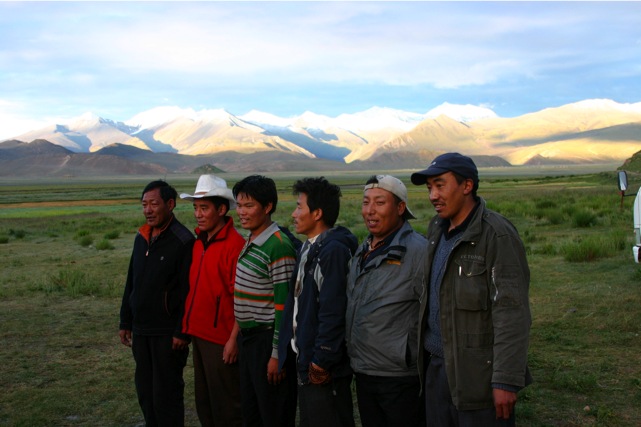 Whenever we crept towards the camping site, our tents and a cozy group tent were erected, a selection of snacks, coffee, and tea displayed for our pleasure, and dinner sizzling in the wok. The food was simple but delicious, and we might well have had the best ‘frites’ and tomato soup of our lives. All hail our valiant helpers!
Whenever we crept towards the camping site, our tents and a cozy group tent were erected, a selection of snacks, coffee, and tea displayed for our pleasure, and dinner sizzling in the wok. The food was simple but delicious, and we might well have had the best ‘frites’ and tomato soup of our lives. All hail our valiant helpers!
 Whenever we crept towards the camping site, our tents and a cozy group tent were erected, a selection of snacks, coffee, and tea displayed for our pleasure, and dinner sizzling in the wok. The food was simple but delicious, and we might well have had the best ‘frites’ and tomato soup of our lives. All hail our valiant helpers!
Whenever we crept towards the camping site, our tents and a cozy group tent were erected, a selection of snacks, coffee, and tea displayed for our pleasure, and dinner sizzling in the wok. The food was simple but delicious, and we might well have had the best ‘frites’ and tomato soup of our lives. All hail our valiant helpers!To trek or not to trek?
Monday morning I wake up and feel devoid of energy, probably due to the altitude and a cold. So I spend the day sleeping, hobbling in the truck that follows the walkers, and listening to people who say I should eat and drink. A little water is okay, but eating is unappealing. I try. A little. Next morning I feel better. But today the trek will be extra heavy with no opportunity to change to the truck half way. So I do the sensible thing and go with the truck to the day’s destination.
 Our group made extensive use of the baggage truck, because the altitude affected us considerably. Among the slain, shockingly, my beloved husband, who spent the first full day of the trek unconscious and sandwiched between two mattresses. I myself was touched by the horror of altitude sickness briefly for a morning and found myself unable to bend over and retrieve my deodorant. The hand was too heavy. This weakness and nausea are pretty scary. Luckily, Niels recovered the day after; he was already strong enough to frolic about at a nearby monastery.
Our group made extensive use of the baggage truck, because the altitude affected us considerably. Among the slain, shockingly, my beloved husband, who spent the first full day of the trek unconscious and sandwiched between two mattresses. I myself was touched by the horror of altitude sickness briefly for a morning and found myself unable to bend over and retrieve my deodorant. The hand was too heavy. This weakness and nausea are pretty scary. Luckily, Niels recovered the day after; he was already strong enough to frolic about at a nearby monastery.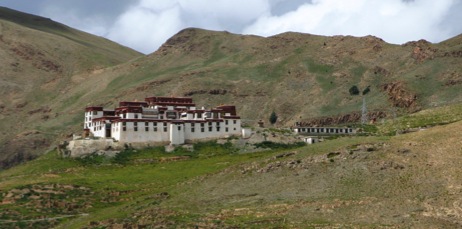 We are with four defectors, so we set up camp and then have little to do. So Hans, Frans, and I decide to make a little walk to the village. In the village there is the monastery up hill. Shall we go there? Frans refuses, but we go anyway. As usual, these things are higher than they seem, so we end up huffing and puffing at the monastery, but at least with the feeling of accomplishment. The monastery (Samding) has a female abbot, who is the leader of all Tibetan nuns. And is therefore in Lhasa all year.
We are with four defectors, so we set up camp and then have little to do. So Hans, Frans, and I decide to make a little walk to the village. In the village there is the monastery up hill. Shall we go there? Frans refuses, but we go anyway. As usual, these things are higher than they seem, so we end up huffing and puffing at the monastery, but at least with the feeling of accomplishment. The monastery (Samding) has a female abbot, who is the leader of all Tibetan nuns. And is therefore in Lhasa all year. When we arrive, a bunch of monks have food near the entrance. At a gesture of one of them, the youngest runs off and comes back with a book of tickets. We buy a ticket, and now the boy is handed a ring of keys. We follow him and get our tour through the monastery.
Days 2 and 3 -- from the perspective of someone not too weak to walk
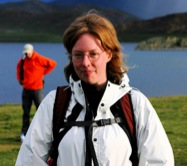 The trek itself was predictably spectacular - the lake was just as turquoise, the snow-topped mountains just as close as on the pictures.
The trek itself was predictably spectacular - the lake was just as turquoise, the snow-topped mountains just as close as on the pictures. I remember the feeling from visiting Venice - this incredulous sensation of “oh my god, it’s really that beautiful, they didn’t enhance the pictures...”
We took some passes and quietly walked along narrow paths, stunned by the beauty surrounding us. The mountains looked like heaps of velvet cloth, the lake was as smooth as a mirror.
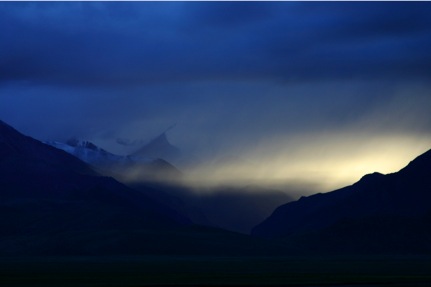 On the third day, we “trekked” with horses in case people would tire along the way (they did - those that dared to join us at all, with three passes to look forward to!).
On the third day, we “trekked” with horses in case people would tire along the way (they did - those that dared to join us at all, with three passes to look forward to!).It occurred to me that the sherpas probably thought we were nuts - they had perfectly fine horses to carry us and/or our bags, and we insisted on wanting to walk - tongues hanging out, hands pushed into our sides, faces red, panting...the sherpas themselves were, of course, unfazed, being adapted to the height.
Overall, the trek was a very simple and peaceful experience. The landscape was so beautiful it feels almost like a sacrilege to try to describe it.

Camping...

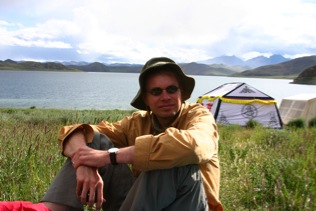
...something I can do without. Small tents smelling faintly of storage, hard “self inflating” (ha ha) mattresses, washing in the icy lake (alternative: “Nihao wipes”), and the constraints of the sleeping bag - no thanks. Add to that the joy of being awakened each morning night by cheerful Dawa, who, brandishing a tape recorder blaring “Tibet Pop” (Ace of Base, but in Tibetan), wishes us a “Good morning! Tashi delek”, not giving up until each and every tent has responded --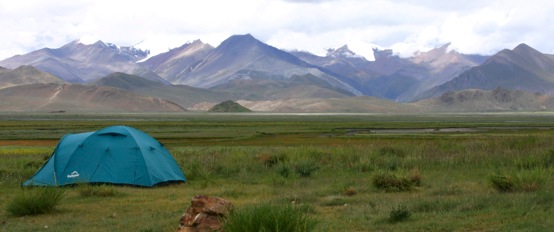 and you’ll understand why a week in a luxury suite in the “Hotel des Bains” currently holds slots one to five on my “next vacation” wishlist. Oh, and I didn’t even mention the thrill of peeling yourself out of the sleeping bag in the middle of the freezing night to indulge in...taking a leak.
and you’ll understand why a week in a luxury suite in the “Hotel des Bains” currently holds slots one to five on my “next vacation” wishlist. Oh, and I didn’t even mention the thrill of peeling yourself out of the sleeping bag in the middle of the freezing night to indulge in...taking a leak.
 and you’ll understand why a week in a luxury suite in the “Hotel des Bains” currently holds slots one to five on my “next vacation” wishlist. Oh, and I didn’t even mention the thrill of peeling yourself out of the sleeping bag in the middle of the freezing night to indulge in...taking a leak.
and you’ll understand why a week in a luxury suite in the “Hotel des Bains” currently holds slots one to five on my “next vacation” wishlist. Oh, and I didn’t even mention the thrill of peeling yourself out of the sleeping bag in the middle of the freezing night to indulge in...taking a leak. No more camping.


